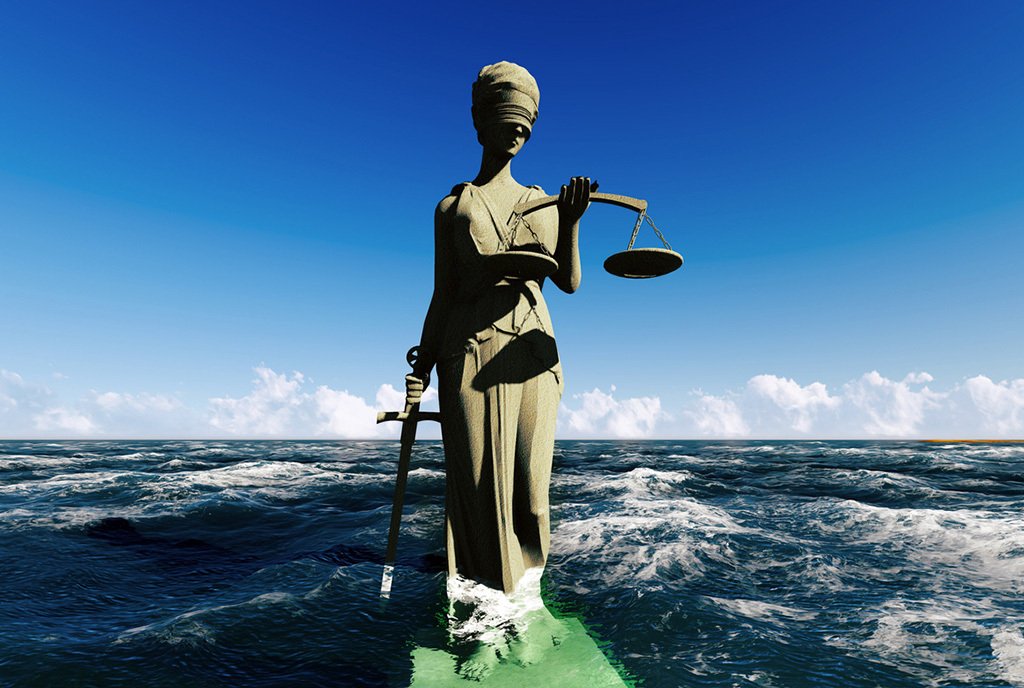
Lawsuits as a tool in the fight against climate change—trying to hold polluters accountable for carbon emissions and governments liable for damaged and dangerous environments—are not new. What is new is that they are on the rise, and plaintiffs are actually beginning to win them, such as in the recently decided Held v. Montana, in which a group of young people sued their state over its extraction policies.
On September 11, less than a month after that victory, another landmark climate case headed to court. This time multiple small island nations came together to take legal action against much larger, high-emission countries. The hearing is considered to be the world’s first ocean climate justice case. At issue is whether carbon emissions absorbed by marine environments should be classified as pollution, and what responsibilities countries have to pay for them.
Coral bleaching and ocean acidification are some of the harmful effects of carbon pollution and warming temperatures.
Nine Pacific and Caribbean island nations, including the Bahamas, Tuvalu, and Antigua and Barbuda, have joined together to make their case in front of the International Tribunal for the Law of the Sea in Hamburg, Germany. These islands have been dealing with rising sea levels and storms increasing in size and frequency—effects of climate change which the islands allege have been worsened by the actions of much larger countries. This case has global implications; as the New York Times reported, “the court’s opinion could lead to wide-ranging claims for damages.”
The Law of the Sea
Already, in the days since the tribunal convened to hear the islands’ case, the Philippines has announced it is considering pursuing legal action against China for damages sustained by coral in South China Sea reefs.
Coral bleaching and ocean acidification are some of the harmful effects of carbon pollution and warming temperatures that can impact the ecosystem. In addition, the small island nations have sounded the alarm that more low-lying island states are “at risk of becoming submerged by water by the end of the century due to slow-onset climate impacts,” as reported by Reuters.
“International law is an essential mechanism for correcting the manifest injustice that our people are suffering as a result of climate change.”The initial days of the hearing, expected to last several weeks total, saw evidence given by Prime Ministers Kausea Natano of Tuvalu and Gaston Browne of Antigua and Barbuda. The prime ministers are representing the Commission of Small Island States on Climate Change and International Law (COSIS). Larger countries, including Germany, France, Australia, and Saudi Arabia, are also expected to speak at the hearing.
The International Tribunal for the Law of the Sea was established in 1982 by the United Nations Convention on the Law of the Sea. It is an independent, intergovernmental organization. Like all courts, it is designed to adjudicate disputes. In the tribunal’s case, it specifically looks at the interpretation and application of the Convention on the Law of the Sea: an international agreement which establishes the legalities of maritime and marine activities.
As Reuters reported, following testimony in the small island nations’ case, the tribunal will “issue an advisory opinion, which is not legally binding, but offers an authoritative statement on legal matters that could guide countries as they craft climate protection law.”
Sign up for our free newsletters
Subscribe to NPQ's newsletters to have our top stories delivered directly to your inbox.
By signing up, you agree to our privacy policy and terms of use, and to receive messages from NPQ and our partners.
Despite the potential limitations of the case’s outcome, plaintiffs are hopeful that this legal intervention could have an impact. As Prime Minister Natano said in his testimony, “We come here seeking urgent help, in the strong belief that international law is an essential mechanism for correcting the manifest injustice that our people are suffering as a result of climate change.”
“Natural disasters are more frequent and catastrophic, and developing countries are more vulnerable.”
Vulnerable Communities and Islands
Climate change disproportionally impacts poorer communities and countries, which have fewer resources to deal with its damaging effects. As the planet heats up, “natural disasters are more frequent and catastrophic, and developing countries are more vulnerable,” as the Brookings Institute wrote. While climate change is a global phenomenon, a 2016 study published in Nature found that “the risks and impacts of climate change differ by place and time. Local values and contexts matter,” the researchers wrote, pointing out the particular dangers faced by countries like the ones speaking before the tribunal. “Small islands are vulnerable to sea-level rise.”
Larger, richer countries, responsible for an overwhelming share of polluting—and therefore also for the effects of that pollution—should be held accountable, according to the prime ministers. The world’s biggest polluters? China and the United States, which globally produce the most greenhouse gases.
Whether the tribunal agrees with the plaintiffs’ assessment remains to be seen. The hearings lasted until September 25; at press time, the tribunal had not yet released their opinion.
As reported by Reuters, Browne, of Antigua and Barbuda, described the hearing at the International Tribunal for the Law of the Sea as “a complementary pathway” to other official actions taken by the island nations. Those have been slower to show results, including asking the United Nations for help.
“Over 30 years, we have been pleading with the large emitters of greenhouse gases to reduce emissions. But they have not heeded our calls,” Browne said.










